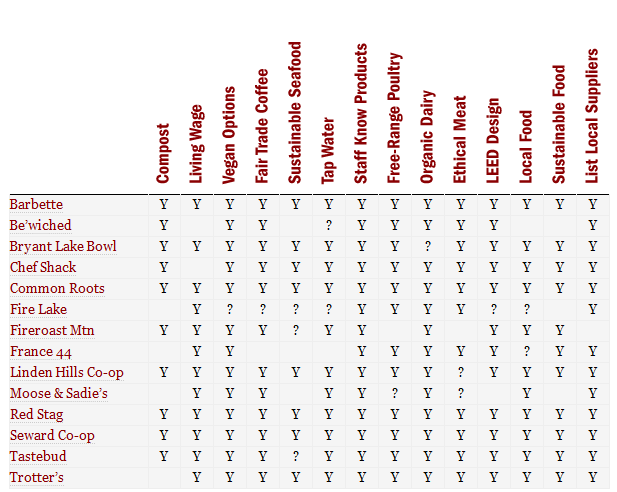Looking for a good place for dinner but are worried that eating out may compromise your ethics? Worry no more.
The Heavy Table (a Twin Cities-based magazine telling the stories of food and drink in the Upper Midwest), Danny Schwartzman of Common Roots, veterinarian Will Winter of Thousand Hills Cattle company, and Jane Rosemarin from Slow Food Minnesota have teamed up to put together an atlas of ethical eating for Minneapolis-St. Paul.
The quest to eat ethically is not a simple one. Many conflicting and complementary ideas need to be considered — the welfare of animals, the environmental impact of food production, and the welfare of workers are just three broad starting points.
Businesses were asked to respond to the following 14 questions:
- Does your establishment compost its biodegradable waste?
- Do all your employees receive a living wage? (Roughly $10/hour, as per the “Living Wage Calculator“)
- Does your establishment offer vegan options? (Please cite one or two current examples)
- Is the coffee served at your restaurant fair trade certified? (Please cite your supplier)
- Does your restaurant adhere to sustainable seafood guidelines (green “best” or yellow “good alternative” ratings via the Monterey Bay Aquarium’s Seafood Watch program?)
- Does your restaurant use sustainable alternatives instead of bottled water — i.e. purified or straight tap water?
- If one of your servers was asked where a given menu item had come from, could he or she accurately cite the source?
- Is the poultry that you serve free range as much of the year as possible? (Cite your supplier)
- Are the dairy products you choose organic and/or hormone/antibiotic free?
- How much of your meat (in terms of a rough percentage of meat-based menu items) is:
- Grass/hay fed? (Name the rancher and, if possible, the approximate percentage of diet that comes from grass/hay.)
- Pasture raised from birth to market, weather permitting?
- Hormone/antibiotic free?
- What efforts have you take to reduce your carbon footprint and environmental footprint?
- What proportion of the restaurant’s food supply comes from locally grown sources — please use a rough percentage of menu items. We’re defining “local” as Minnesota, the Dakotas, Iowa and Wisconsin.
- For specialty ingredients that cannot be sourced locally, what efforts have been made to purchase from sustainable sources?
- List some or all of the local farmers / brewers / cheesemakers that you work with, listing the suppliers from whom you purchase most frequently first.

Leave a Reply